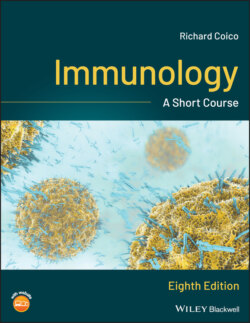Читать книгу Immunology - Richard Coico - Страница 118
MAJOR CLASSES OF ANTIGENS
ОглавлениеThe following major chemical families may be antigenic.
1 Carbohydrates (polysaccharides). Polysaccharides are only immunogenic when associated with protein carriers. For example, polysaccharides that form part of more complex molecules—glycoproteins—will elicit an immune response, part of which is directed specifically against the polysaccharide moiety of the molecule. An immune response, consisting primarily of antibodies, can be induced against many kinds of polysaccharide molecules, such as components of microorganisms and of eukaryotic cells. An excellent example of antigenicity of polysaccharides is the immune response associated with the ABO blood groups, which are polysaccharides on the surface of the red blood cells.Figure 5.6. Some possible antigenic structures containing single and multiple epitopes.
2 Lipids. Lipids are rarely immunogenic, but an immune response to lipids may be induced if the lipids are conjugated to protein carriers. Thus, in a sense, lipids may be regarded as haptens. Immune responses to glycolipids and to sphingolipids have also been demonstrated.Nucleic acids. Nucleic acids are poor immunogens by themselves, but they become immunogenic when they are conjugated to protein carriers. DNA, in its native helical state, is usually nonimmunogenic in normal animals. However, immune responses to nucleic acids have been reported in many instances. One important example in clinical medicine is the appearance of anti‐DNA antibodies in patients with systemic lupus erythematosus (discussed in detail in Chapter 12).Read the related case: Hereditary AngioedemaIn Immunology: Clinical Case Studies and Disease Pathophysiology
3 Proteins. Virtually all proteins are immunogenic. Thus, the most common immune responses are those to proteins. Furthermore, the greater the degree of complexity of the protein, the more vigorous will be the immune response to that protein. Because of their size and complexity, proteins contain multiple epitopes.
